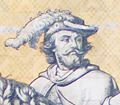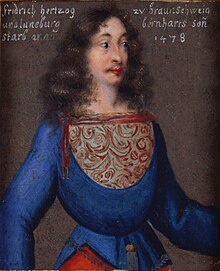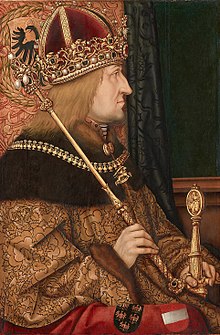 |
| Friedrich I of Austria the Handsome @Wikipedia |
Friedrich I of Austria (Duke)
the Fair, the Handsome (Ger. der Schone)
" . . . Frederick was so handsome that he was known as Frederick the Fair. . . ." (Sime. History of German: 99)
the Handsome: " . . . Frederic, who was in the twenty-third year of his age, was tall and well proportioned, and surnamed the Handsome, from the elegance of his person and the beauty of his countenance. He was the most amiable and accomplished prince of his age; and though brave even to rashness, was of a mild, benevolent and conciliating temper. . . ." (Coxe: 82)
Barbaros Hayreddin:
Barbarossa (the Redbeard):
the Sleeping Hero, the Sleeping King.
 |
| Friedrich I of Meissen the Brave @Wikipedia |
Friedrich I of Thuringia:
the Bitten (Ger. der Freidige)
"Friedrich I (1257-1323) the Brave or the Bitten (he had allegedly been bitten by his distraught mother when she heard about Kunigunde) was the eldest legitimate son who, after beating his father in battle, eventually succeeded to the remnants of the inheritance. As a result of his mother's royal blood he maid claim to be the King of Jerusalem and Sicily, but despite a few campaigns in Italy was unable to turn this ambition into reality. . . ." (Thomson. The Other Kaisers)
" . . . Whilst her attendants were collecting a few necessaries, the unfortunate landgravine went to her beloved children who were in an adjoining chamber, and took leave of them with a flood of tears. Such was the violence of her emotion, that in taking a parting embrace of her favourite, Frederic, who was twelve years old, she bit his right cheek so severely, that he afterwards retained the mark of this token of maternal affection, and received in history the surname of The Bitten. . . ." (Shoberl. A historical account, interspersed with biographical anecdotes, of the house of Saxony: 39)
the Brave: (Ger. der Gebissene)
 |
| Friedrich I of Palatinate Wicked Fritz @Wikipedia |
the Victorious:
 |
| Friedrich I of Saxony the Warlike @Wikipedia |
Friedrich I of Saxony (Elector)
the Belligerent:
the Warlike (der Streitbare):
Friedrich I Thuringia.
Joyeux:
Friedrich I of Zollern.
Maute:
Zollner:
 |
| Friedrich II of Brunswick-Luneburg the Pious @Wikipedia |
the Pious (Ger. der Fromme):
 |
| Frierdich II of Germany the Wonder of the World @Wikipedia |
the Astonishment of the World:
the Boy from Apulia, the Child of Apulia (Lat. Puer Apuliae)
the Christian Sultan
the Hammer of Christianity
the Lawgiver, Law-giver, Lawmaker (Tur. Kanuni): "A nickname sometimes given to Frederick II of Germany, because his far-seeing wisdom seemed to anticipate some of those views of equal justice, of the advantages of commerce, of the cultivation of the arts of peace, beyond all the toleration of adverse religions, which even in a more dutiful son of the Church would doubtless have seemed godless indifference." (Sobriquets and Nicknames: 184)
the Marvelous
the Wonder of the World, the World's Wonder (Lat. Stupor Mundi): He was the most scientific monarch of the thirteenth century, and probably the most intellectually distinguished ruler of the Middle Ages, following in the footsteps of his inquisitive grandfather, Roger II, who filled the Sicilian court with scientists and men of letters. Frederick II was King of Sicily, Emperor of the Holy Roman Empire and King of Jerusalem - all actual dominions he ruled. But the greatest title attributed to him was Stupor Mundi, Wonder of the World." (Mendola. Was Frederick II an Atheist? @Best of Sicily Magazine)
 |
| @Wikipedia |
the Pious:
Fritz der Einzige:
Old Fritz:
the Enlightened Despot:
the Evil Man in Sansoucci:
the First Servant of the State:
the Great:
Rocho:
 |
| Friedrich III Emperor Nightcap @Wikipedia |
--" . . . Frederick III, whose indolence earned for him the nickname of Emperor Nightcap, occupied the throne from 1440 to 1493. . . ." (Haiti: Her History and Her Detractors)
--"Frederick III often fell asleep whilst the most important affairs of the State were being discussed, which acquired for him the nickname of 'Emperor Night Cap." When the Turks were destroying the villages and harvests of his people, he amused himself in his garden picking caterpillars out of his roses, and catching slugs with buttered cabbage leaves." (Royalty in All Ages)
the Arch-Sleepyhead of the Holy Roman Empire
"Frederick was the first Habsburg Holy Roman Emperor. He was called the arch-sleepyhead and mocked for being an inefficient ruler of his Imperial lands because he focused on his hereditary lands." (Strange and insulting historical royal nicknames @Royal Central)
the Holy Roman Empire's Arch-sleeping-cap
"When Frederick died on August 19, 1493, he had reigned 53 years, longer than any other German monarch. A common opinion of him by contemporaries and later historians alike concluded that he was ineffectual. A popular nickname, the 'Heiliges Römisches Reiches Erzschlafmütze' ('Holy Roman Empire's Arch-sleeping-cap'), captures that perception of laziness. Yet Frederick also stubbornly continued to fight for his own prerogatives and those of the House of Habsburg. One source of his success was his longevity; he managed to outlive his rivals. On the other hand, his priority was not the empire, and his neglect surely inspired the German princes to seek a remedy for the empire's constitutional weakness. Most significantly, by arranging the fortuitous marriage of his son to the Burgundian heiress and by ensuring Maximilian's succession to both the Habsburg and the imperial title, Frederick helped usher in a new phase of imperial history." (Pavlac & Lott. The Holy Roman Empire: A Historical Encyclopedia: 225)
the Emperor of the Jews, the King of the Jews.
"Ladislaus died when only seventeen years old (Nov. 23, 1457), and his lands passed into the possession of Frederick V. of Styria, who was also German emperor after 1440. Frederick was always in financial difficulties, and therefore needed the Jews; but he was also favorably inclined to them from humanitarian reasons, so that people gave him the nickname "King of the Jews." Probably because of the attacks on them by Capistrano, Frederick obtained from Pope Nicholas V. a bull (issued Sept. 20, 1451) granting him express permission to allow Jews to reside in all of his dominions, which included Austria, Carinthia, Carniola, Styria, Tyrol, and Alsace (Vorder-Oesterreich). This permission is explained by the fact that the Jews were tolerated for the benefit of the inhabitants needing moneylenders (Christians not being allowed to engage in this business), and, further, because tradition had from time immemorial sanctioned this toleration. . . ." (Jewish Encyclopedia)
the Lame: "In this same year, 1493, occurred the death of the Emperor Frederick III, who for some years had retired from public business. . . He had been for some time in failing health, suffering from decay of the bones of one leg. As long as possible he refused to allow an operation to be performed, and at length when enduring the agony of amputation at the knee cried out: 'Alas! Kaiser Frederick, that you must bear to all posterity the nickname of 'the Lame'!' But he was not long suffered to endure this indignity, for he died soon afterwards, it is said from eating too many melons, on August 19, 1493, at the age of seventy-eight. . . ." (Hare: 72)
the Fat:
the Heir
the Wise: " . . . [T]hey offered the crown to Frederic of Saxony, whose virtues and abilities had justly procured him the appellation of The Wise. He, however, magnanimously declined the proffered dignity, and earnestly exhorted them to give the preference to Charles. . . ." (Coxe: 405)
Frederick of the Empty Pocket; Frederick the Empty Purse:
--"And what is the goldene Dachl-Gebdude?—It is a most picturesque addition to, and almost all remaining of, what in -his time was the Firstenburg, or princely palace, having a roof of shining gilt copper tiles, sufficiently low to be in sight of the passer-by; but the account the best English guide-book gives the tourist of its origin is so wanting in the true appreciation of Friedl's character, that I am fain to supply the Tirolese version of it. The above account says that it was built in 1425 ' by Frederick, called in ridicule "Empty Purse," who, in order to show how ill-founded was the nickname, spent thirty thousand ducats on this piece of extravagance, which probably rendered the nickname more appropriate than before.' Now, to say that he was called ' Empty Purse' thus vaguely would imply that it was a name given by common consent, and generally adopted. To say that he built the Golden Roof only to show that such a nickname was ill-founded, is simply to accuse him of arrogance. To treat it as an extravagance which justified the accusation, is to convict him of folly." (The Valleys of Tirol: 241)
--Count of the Empty Pockets: "Just after you leave the Hofkirche, you find yourself just opposite to the 'Golden Dachl,' which the natives tell you is a roof built of pure gold, but which the skeptical declare to be copper gilded. The roof covers a handsome Gothic balcony and blazes as splendidly as if it were gold. . . It is said to have cost seventy thousand dollars, and was built by Count Frederick of Tyrol, who was called 'The Count of the Empty Pockets,' to refute his nickname." (Bell: 81)
the Penniless, Pennyless: "From this period the life of Frederic presents few events worthy of record; as sensible of the rashness and folly of his former conduct, he applied himself to the interior government of the Tyrol. By the most rigid economy, by the imposition of taxes, by confiscating the estates of the nobles who had shewn an aversion to his government, and adhered to his brother Ernest, he amassed a considerable treasure, and redeemed most of the territories which had been mortgaged during his disputes with Sigismond. He seems to have been affected by the nickname of Frederic the Pennyless, which was given him during his destitute state at Constance: with a view to remove the imputation, besides his treasures, he collected jewels and rarities to a considerable amount, and, with a childish ostentation, richly gilded the copper roof of his chancery at Inspruck. . . ." (History of the House of Austria: Vol 1: 282)
Friedrich IV of Brunswick.
the Restless:
Probus:
the Just
the Honourable
the Righteous.
 |
| Frederick V of the Palatinate the Winter King @Wikipedia |
Friedrich II of Bohemia
Goodman Palsgrave, Goody Palsgrave:
"Contemptuous nicknames given respectively to Frederick V, elector palatine (Ger. pfalzgraf, Eng. palsgrave), and to his wife Elizabeth, daughter of James I of England." (Wheeler. A Dictionary of the Noted Names of Fiction: 152)
" In 1621, when he was in the Fleet Prison at the instance (doing) of the Privy Council, he was impeached by the House of Commons for having said: 'I have heard that Prague is taken; and Goodman Palsgrave and Goodwife Palsgrave have taken their heels; and as I have heard, Goodwife Palsgrave is taken prisoner.'" (Wikipedia)
the Winter King: " . . . Frederick had been called to the throne in 1619 by a country in rebellion against its Catholic Habsburg ruler, but he was defeated within a year at the battle of the White Mountain, deposed, and in recognition of his fleeing reign known thereafter as the 'Winter King'. . . ." (Van der Kiste. Georgian Princesses)
Friedrich V of Schalksburg.
Mulli:
the Illustrious.
the Great.
Friedrich VIII of Zollern (d.1333)
Ostertag:
Oettinger: "Count Frederick the Oettinger was so surnamed because he was educated at the Court of the Counts of Oettinger, to whom his father had been much attached. . . ." (Wyatt: 422)
der Strassburger: Count of Hohenzollern (d.1365). "He was a canon in Strassburg before returning to Hohenzollern."
Friedrich of Hohenzollern, Bishop of Constance.
Fritzli:
Friedrich of Hohenzollern (fl.1418), a monk
Hügeli, Hugali:
Father of the Country (by citizens):
Probus:
the Just: " . . . Frederic Augustus spent the last twelve years of his life in healing the wounds of his diminished country, by promoting its agricultural, commercial, and mining interests, by establishing or developing institutions of art and science, and particularly by a strict administration of justice. His grateful subjects bestowed upon him the surname of the Just. . . ." (Peake: 493)
the Red Prince:
--"Prince Frederick Charles Nicholas, who was popularly known during the Franco-Prussian war as the "Red Prince," on account of the dash and vigor which characterized his military movements, died in the Castle of Glienicke. . . ." (NYT)
--" . . . In this war he had been with the troops of Prince Karl Friedrich, known as the 'Red Prince,' from his flaming red beard and red Hussar uniform, which he eternally wore. . . ." (The Big Rape)
Fat Sallywag (Ger. der Dicke Luderjahn):
the Fat:
Cliquot (Kleeko): "Cliquot. A nickname given to Frederick William IV., King of Prussia, from his fondness of champagne, the sobriquet being the name of a celebrated brand." (Frey: 66)
the Great Elector: "At Warsaw in 1656 the Brandenburgers had shown their mettle as coalition partners; at Fehrbellin nineteen years later the Elector's army, though outnumbered and forced to advance at lightning speed, prevailed without aid over an enemy with an intimidating European reputation. Here too the Elector, now a stout man of fifty-five, stayed at the centre of the action. . . It was after the victory at Fehrbellin that the soubriquet (sic) 'the Great Elector' first appeared in print. . . But unlike so many other early modern 'greats' . . . this one survived, making Elector Frederick William the only non-royal early modern European sovereign who is still widely accorded this epithet." (Clark: 47)
the Black Duke (Ger. der Schwarzer Herzog) "The dispossessed Friedrich Wilhelm of Brunswick was totally concerned with the idea of revenge against Napoleon for the damage which had been done to his family and lands. As a physical expression of this vengeance he decided to clothe his troops all in black and adopted as his badge the skull and crossbones. As a result he became known as Der Schwarzer Herzog (the Black Duke) and his corps was christened Die Schwarze Schar (the Black Horde)." (The Black Brunswickers: 7)
Novalis: " . . . In 1798 he became betrothed to Juliane von Charpentier and published 'Blüthenstaub' which was a collection of fragments and for which he used the pseudonym Novalis for the first time. . . ." (Lutetia: 2008)
the Ablest Soldier of His Age (by Defoe)
--Frederick Schomberg was the Ablest Soldier of His Age, as Daniel Defoe called him.(Glozier: 160)
--"Frederick Herman von Schomberg was rightly called at the time of his death the 'ablest soldier of his age'. He spent a lifetime perfecting his knowledge of the art of war and used this to effect, throughout a life that contained great achievements. . . ." (Glozier: 178)
the First Captain of Europe (Macaulay):
the Greatest Soldier in Europe (by Macaulay): "'The loss of the conquerors did not exceed five hundred men; but among them was the first captain of Europe. . . The greatest soldier in Europe.' . . ." (Allibone: 1951)
the Cruel: "Fruela I, the eldest son of Alfonso, is represented as stern in disposition, as cruel in his habits, and valiant in war. . . The harsh character of Fruela, joined perhaps to the natural inconstancy of man, led to a revolt in Galicia and Biscay; but he succeeded in repressing both, and he inflicted a heavy punishment on the rebels. The man, indeed, who with his own hands shed the blood of an innocent brother, was not likely to spare guilty subjects. But in the end, finding his yoke intolerable, or perhaps resolved no longer to obey a fratricide, his people rose and slew him, after a reign of somewhat more than eleven years in A.D. 768. . . ." (Dunham: 134)
Fyodor, Prince Glazaty.
Chervliony:
Fyodor, Prince Gorbaty-Shuiski. [7]
Kusnets: '
Fyodor of Staroriazan.
Tretnoy:
Fyodor of Starodub.
Blagovierniy:
the King of Presburg: " . . . Lefort and Peter, as pro-deacons, and the three-score clergy sat around the Hall of the Consistory upon casks, before the throne of Ramodanofsky, who was named the King of Presburg (Presburg being a relic of the sham-fights of Peter's childhood). . . ." (Jones: 50)
No comments:
Post a Comment